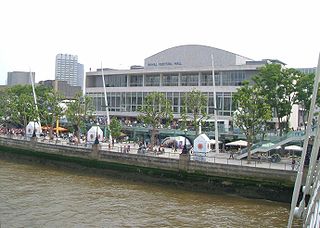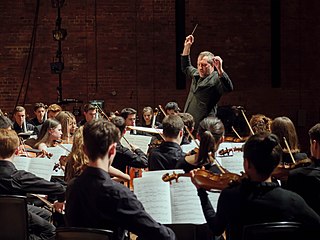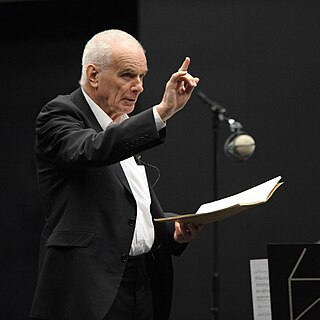
Sir Simon Denis Rattle is a British-German conductor. He rose to international prominence during the 1980s and 1990s, while music director of the City of Birmingham Symphony Orchestra (1980–1998). Rattle was principal conductor of the Berlin Philharmonic from 2002 to 2018. He has been the music director of the London Symphony Orchestra since September 2017. Among the world's leading conductors, in a 2015 Bachtrack poll, he was ranked by music critics as one of the world's best living conductors.
The BBC Symphony Orchestra is a British orchestra based in London. Founded in 1930, it was the first permanent salaried orchestra in London, and is the only one of the city's five major symphony orchestras not to be self-governing. The BBC SO is the principal broadcast orchestra of the British Broadcasting Corporation (BBC).

The London Symphony Orchestra (LSO) is a British symphony orchestra based in London. Founded in 1904, the LSO is the oldest of London's symphony orchestras. The LSO was created by a group of players who left Henry Wood's Queen's Hall Orchestra because of a new rule requiring players to give the orchestra their exclusive services. The LSO itself later introduced a similar rule for its members. From the outset the LSO was organised on co-operative lines, with all players sharing the profits at the end of each season. This practice continued for the orchestra's first four decades.

The London Philharmonic Orchestra (LPO) is one of five permanent symphony orchestras based in London. It was founded by the conductors Sir Thomas Beecham and Malcolm Sargent in 1932 as a rival to the existing London Symphony and BBC Symphony Orchestras.

Sir Colin Rex Davis was an English conductor, known for his association with the London Symphony Orchestra, having first conducted it in 1959. His repertoire was broad, but among the composers with whom he was particularly associated were Mozart, Berlioz, Elgar, Sibelius, Stravinsky and Tippett.
Sir George William John Benjamin, CBE is an English composer of contemporary classical music. He is also a conductor, pianist and teacher. He is well known for operas Into the Little Hill (2006), Written on Skin (2009–2012) and Lessons in Love and Violence (2015–2017)—all with librettos by Martin Crimp. In 2019, critics at The Guardian ranked Written on Skin as the second best work of the 21st-century.

Thomas Joseph Edmund Adès is a British composer, pianist and conductor. Five compositions by Adès received votes in the 2017 Classic Voice poll of the greatest works of art music since 2000: The Tempest (2004), Violin Concerto (2005), Tevot (2007), In Seven Days (2008), and Polaris (2010).

Daniel John Harding is a British conductor.

St Luke's is a historic Anglican church building in central London, and in the London Borough of Islington. It served as a parish church from 1733 to 1959. It was designed by John James and Nicholas Hawksmoor, and is a Grade I listed building.

The London Symphony Chorus is a large symphonic concert choir based in London, UK, consisting of over 150 amateur singers, and is one of the major symphony choruses of the United Kingdom. It was formed in 1966 as the LSO Chorus to complement the work of the London Symphony Orchestra (LSO). The LSC is today an independent self-run organisation governed by a council of nine elected representatives. It continues to maintain a close association with the LSO but also takes part in projects with other orchestras and organisations both in the UK and abroad. The LSC performs mainly with the LSO at the Barbican Centre in London as well as appearing at other concert venues around the UK and Europe and regularly at the Avery Fisher Hall, New York.
Charles Matthew Egerton Hazlewood is a British conductor. After winning the European Broadcasting Union conducting competition in 1995 whilst still in his twenties, Hazlewood has had a career as an international conductor, music director of film and theatre, composer and a curator of music on British radio and television, Motivational Speaker and founder of Paraorchestra – the world's first integrated ensemble of disabled and non-disabled musicians. He was a guest on BBC Radio 4's Desert Island Discs in May 2019 and became Sky Arts' Ambassador for Music in January 2021.
City Noir is a symphonic work by the composer John Adams. A primary inspiration for the piece is the work of historian Kevin Starr on urban California in the late 1940s and early 1950s. The composer characterizes the work as "jazz-inflected symphonic music", citing the French composer Darius Milhaud as originator of this trend. It has a duration of 35 minutes, features solos for alto saxophone, trumpet, trombone, horn, viola, and double bass, and has three movements:

The Barbican Centre is a performing arts centre in the Barbican Estate of the City of London, England, and the largest of its kind in Europe. The centre hosts classical and contemporary music concerts, theatre performances, film screenings and art exhibitions. It also houses a library, three restaurants, and a conservatory. The Barbican Centre is a member of the Global Cultural Districts Network.

TheHeritage Orchestra is a British orchestra founded by Chris Wheeler and Jules Buckley. They perform mainstream, cult, experimental and popular music. The orchestra, which ranges between 25 and 65 members, has performed internationally in venues such as the Sydney Opera House, Emirates Palace, and Hollywood Bowl, and tours throughout the UK to major concert halls and large-scale arenas, including The O2 Arena in London.

The Symphony No. 10, Op. 327, is a composition for orchestra, chorus, and baritone soloist, composed by Peter Maxwell Davies in 2013. It was premiered on 2 February 2014 at the Barbican Hall in London, by the London Symphony Orchestra and Chorus, with baritone soloist Markus Butter, conducted by Antonio Pappano.
Grace-Evangeline Mason is a British composer of contemporary classical music.
Daniel Fardon is a British composer of contemporary classical music.
The Violin Concerto No. 2, Scherben der Stille , is the second violin concerto by the Korean composer Unsuk Chin. It was written for the violinist Leonidas Kavakos in 2021 on a joint commission from the London Symphony Orchestra supported by the Ernst von Siemens Music Foundation, the Boston Symphony Orchestra supported in part by the Massachusetts Cultural Council's New Works Fund, and the Leipzig Gewandhaus Orchestra. The piece was given its world premiere by Kavakos and the London Symphony Orchestra conducted by Simon Rattle at the Barbican Centre, London, on January 6, 2022.
Woven Space is an orchestral composition written in 2017 by the Scottish composer Helen Grime. The work was commissioned by the Barbican Centre for Sir Simon Rattle and the London Symphony Orchestra, which first performed the piece conducted by Rattle on 19 April 2019. The piece was the recipient of the Large Scale New Work award at the 2019 Scottish Awards for New Music.
Bushra El-Turk is a British composer and contemporary music educator of Lebanese parents. Named by the BBC as "one of the most inspiring 100 Women of today", she has written numerous compositions for live concerts, dance, theatre and multi-media performances, performed and broadcast on radio and television by prestigious musicians in various countries of Europe and the Middle East.












